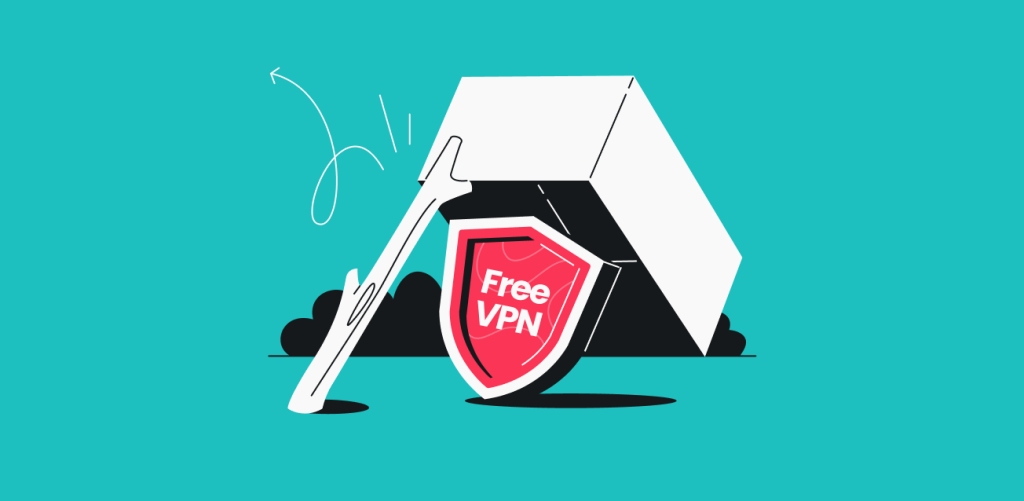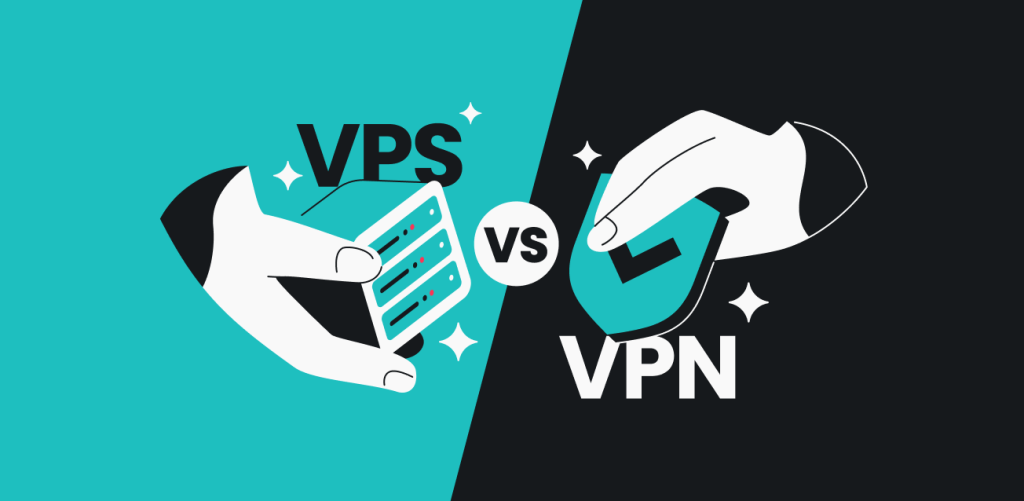
The biggest difference between a free and paid VPN service is that free VPN providers may not charge anything upfront, but they make money via adware or selling your browsing data. Paid VPNs get subscription fees, so they have fewer reasons to rip you off, and they have the funds for research and development. Let’s dig into this deeper.
Table of contents
What are the disadvantages of using free VPNs?
As I mentioned before, a free virtual private network (VPN) service has no subscriptions or upfront costs. But a VPN isn’t like any other free app that can exist with zero upkeep once installed on your device. It depends on the infrastructure established by the VPN provider to exist.
No VPN service would work without a physical server to route the data. That’s why someone has to pay for the server maintenance, and it will likely be you. One of the most lucrative ways VPN providers do it is by selling their users’ browsing data.
Free VPNs collect and sell your data
At the end of the day, a free VPN service still has to make money — and it often does so in shady ways. The most straightforward example is collecting and selling your data for their purposes.
A 2018 study found that half of the most popular free VPN apps for smartphones had links to China. And by “links,” we mean “explicitly stating that they’re logging user data and transferring it to entities in mainland China.” One can only guess the motivations of those entities financing data collection via free VPN services. Whatever they are, they’re incompatible with the desire for privacy that drives VPN use.
A study from 2017 found that 38% of free Android VPN apps had malware or malvertising in them. Two-thirds of the free VPN providers used third-party tracking libraries, meaning someone else was logging your browsing data. The study also shows that over 80% of the apps requested access to sensitive data, while a staggering 84% leaked user traffic.
CSIRO analysis of 283 free Android VPNs: |
|---|
VPNs’ main purpose is to protect user data and privacy. Free services seem to do the opposite and are a terrible subversion of your online security.
Free VPNs provide sub-par services
When it comes to choosing a VPN service, both the number and the quality of servers matter. So, even if you’re OK with paying with your data, you won’t be getting the best service.
A free VPN is highly unlikely to offer thousands of servers worldwide. The more probable scenario is that a free VPN service will only have tens of servers. They’re also unlikely to have a solid connection.
As such, congestion becomes a frequent issue, impacting your internet speed much more. That is, if the free VPN provider isn’t throttling your speed in the first place to entice you to buy their premium package.
Limitations of the top free VPNs (according to data by TechRadar): | Paid VPN for contrast (Surfshark): | |
|---|---|---|
Servers | 1-50+ | 4,500+ |
Server countries | 1-10+ | 100 |
Data limits | 500MB/month* – 10GB/month | No |
~** | No | |
24/7 support | No*** | Yes |
*One provider offers 500MB/day limits
**One provider offers unlimited data but engages in speed throttling
***4 out of 5 VPNs in question
Free VPNs are not secure
Free VPNs lack the funding to invest in security and RnD. A poorly set-up VPN may be using obsolete VPN protocols. Here’s a quick rundown of the most frequently used protocols and what they are best for:
VPN Protocol | Best use |
|---|---|
IKEv2 | Universal, but exceptional on mobile devices |
OpenVPN | Routers |
Wireguard | Universal |
Shadowsocks | Overcoming the Great Firewall |
PPTP | OBSOLETE AND UNSECURE |
L2TP | OBSOLETE AND UNSECURE |
A free VPN can also leak your data in various ways, like via WebRTC vulnerabilities. It is also less likely to have the resources to stave off a hacker attack.
For example, a recent hack on a popular free Android VPN exposed data of 21 million users, including the payment details of users who sprung for the full service.Having a steady guaranteed income flow means spending money on developing additional security features, like split tunneling, Kill Switch, and obfuscation — good features to have if you want to use VPNs to their fullest. But without that subscription money, free VPN services must make do with what they have.
As mentioned above, around 38% of free Android VPNs have been found to host malware or malvertising, which means they’re purposefully unsafe. And that’s before you account for the free VPNs that don’t encrypt your data, which denies one of the main benefits of using a VPN.
What are the benefits of paid VPNs?
The only big downside of a paid VPN is in its name — you need to pay for it. Whether you go for a monthly or yearly subscription, it’s still going to cost you money.
So, what can a VPN do for you if you decide to pay for it instead of choosing a free option? For one, it actually protects your data and privacy instead of putting it at risk. On top of that, you get better connection speeds and plenty of other benefits.
Paid VPNs have a large number of servers available
The subscription money allows VPN services to, among other things, acquire plenty of servers. For example, Surfshark has over 4,500 servers in 100 countries. Not only does this help you find a server that’s free from congestion, but it also finds one that suits your needs the best.
What if you want to watch the content produced in your country while traveling? With a paid VPN, you’ll likely find the server that matches your home country.
Plus, investments in servers lead to benefits like having a 100% RAM-only server roster (which deletes any data on them when they’re unplugged from power) and megabit-rated ports (which means more connection speed).
Paid VPNs have advanced security features
Advanced security alone makes it worth paying for a VPN. For one, it’s harder to detect such VPN use because they can invest more into online security than any free VPN.
A good paid VPN will, by default, be immune to IP, DNS, and WebRTC leaks. It will also be a lot more secure from hackers — one of the largest breaches of a paid VPN provider only revealed what websites the users are visiting but not what they’re doing there. The money is also useful when implementing the best, most secure modern VPN protocols like WireGuard.
But that’s not the only way that paid VPNs can develop. There are also additional features that a VPN user can appreciate.
A paid VPN is more likely to have a Kill Switch to disconnect you from the internet if the VPN unexpectedly goes down. Split tunneling (known as “Bypasser” on Surfshark) allows you to mark websites and services that are exempt from VPN protection. This is very important as some apps (usually banking) are sensitive to VPN use.
Paid VPNs protect data with strong encryption
Encryption is the foundation of a VPN — it’s the process that makes your traffic actually private. So, while some free VPNs don’t encrypt data at all, completely defying the purpose of a VPN, paid VPN services implement the highest-standard encryption, ensuring your data is protected.
VPNs use different encryption standards as part of their VPN protocols. For instance, Surfshark implements AES-256 and ChaCha20, which are considered the most secure ciphers, used by various cybersecurity companies worldwide. These encryption algorithms are virtually impossible to crack, which provides your data with the highest level of protection.
Paid VPNs take your privacy seriously
With privacy at its core, a VPN should never collect and share user data. While many free services have been found doing that, a reputable, paid VPN service will have a no-logs policy to ensure your privacy. Surfshark, for example, doesn’t log your browsing history, network traffic, connection timestamps, or used bandwidth.
Some subscription VPNs offer additional privacy features like a Double VPN (called MultiHop at Surfshark), which increases your privacy by routing your traffic through two different VPN servers and encrypting your data twice.
Free VPN vs. paid VPN: which one is right for you?
First, let’s see how free and paid VPN providers compare.
So, if you only need some degree of privacy, like having a different IP address, and you’re okay with risking your online security and, ironically, privacy for it — you can try using a free service. However, if you want advanced security and privacy features, fast speeds, and an overall reliable VPN, you should opt for a paid service.
If you’re still on the fence about whether to go for a paid VPN, why not take advantage of Surfshark VPN’s free trial to experience the difference yourself?
In conclusion: in free VPN vs. paid VPN, paid VPN wins
There are edge cases when it’s OK to use a free VPN — like if you only need to use a VPN once to access a website on a long-distance bus Wi-Fi network. But when it comes to free vs. paid VPN services for sustained everyday use, paying a subscription fee buys you not only a massive improvement in the obvious basic features, such as speed, servers, etc., but also necessities like security and privacy.
FAQ
Is a paid VPN better than a free VPN?
A paid VPN is better than a free VPN in every aspect except for the price. However, free VPNs usually make their money in shady, non-obvious ways (like selling your data).
Do free VPNs work with Netflix?
Free VPNs are unlikely to work with Netflix because:
- Their limited roster of servers is easy to block;
- The servers are likely to be congested;
- They usually have speed limitations to make you go premium.
Are any VPNs free?
There is a saying, “If something is free, you are the product,” which means that free apps aim to capitalize on their users in one way or another. So, free VPNs do it with ads, malware, and selling your data.
How do free VPNs make money?
In the best-case scenario, a free VPN will make money from ad revenue by bombarding you with ads. More shady services, however, might earn their money by malvertising and selling your data.


